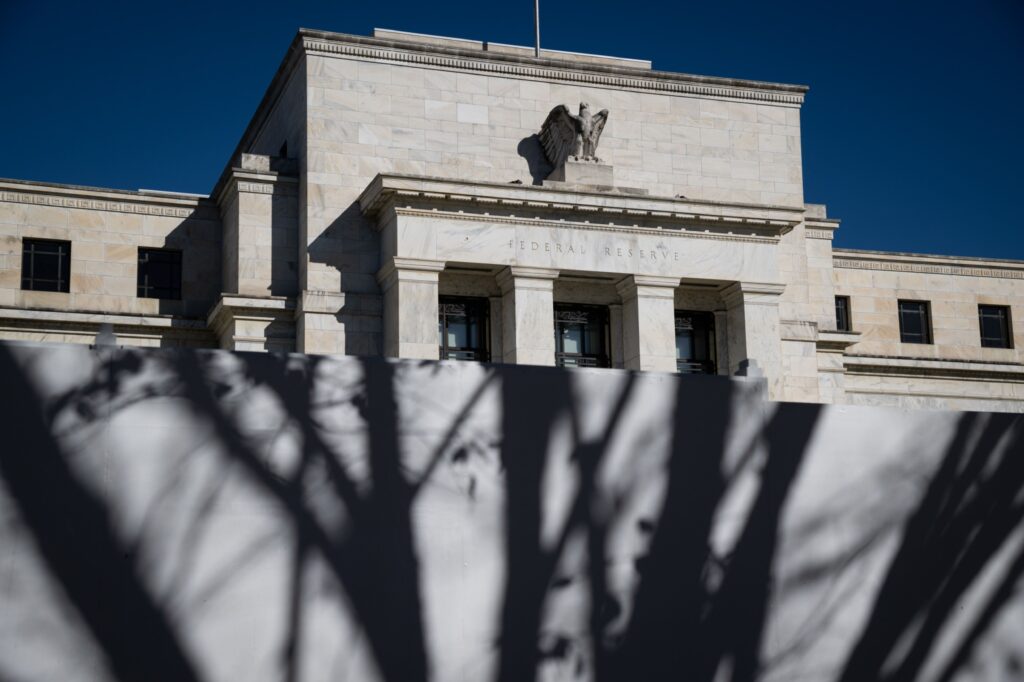
The Marriner S. Eccles Federal Reserve building in Washington, DC, US, on Wednesday, Nov. 9, 2022. The Republican wave that was supposed to undo Joe Biden's presidency failed to arrive as GOP candidates were projected to dominate Tuesday's midterm elections, with polls showing voters bitter about the state of the economy.
The recent passage of the anti-central bank digital currency (CBDC) bill, known as H. R. 1919, has sparked significant debate around its potential implications for financial privacy and innovation. Approved by the House of Representatives in March 2024, this legislation prohibits the Federal Reserve from issuing a CBDC, further complicating the landscape of digital finance in the United States.
The anti-CBDC bill is part of a broader legislative effort that also includes the GENIUS Act, which addresses stablecoins, and the CLARITY Act, aimed at establishing a framework for digital asset markets. While the GENIUS Act has already been signed into law, the CLARITY Act is set to face scrutiny in the Senate after the summer recess. However, it is the anti-CBDC bill that has garnered less attention, despite its potential long-term consequences.
Understanding the Anti-CBDC Bill
H. R. 1919 is succinct, spanning just one page, yet it imposes significant restrictions on the Federal Reserve’s ability to engage with digital currencies. Specifically, the bill prohibits any Federal Reserve bank from offering financial products or services directly to individuals, which includes any form of digital currency that would be a direct liability of the Federal Reserve System.
This legislation raises questions about the Federal Reserve’s future role in digital finance. As Federal Reserve Chair Jerome Powell has repeatedly emphasized, the central bank cannot extend its mandate without congressional approval. Given that the public and private sectors would likely view a CBDC as an overreach, obtaining such approval is improbable.
The bill goes further, stating that the Federal Reserve “may not test, study, develop, create, or implement” anything resembling a CBDC. This prohibition could hinder the Fed’s participation in international discussions on digital currencies and impede its influence in global financial matters. For instance, it might necessitate the Federal Reserve Bank of New York’s withdrawal from Project Agorá, an initiative from the Bank for International Settlements aimed at exploring cross-border tokenized payments.
The Privacy Debate
Proponents of the anti-CBDC bill argue that it is essential for protecting individual privacy. There is a prevalent concern that a digital currency issued by the central bank would enable the government to monitor all transactions, potentially undermining financial confidentiality. Yet, nearly 90% of payments are already digital, and reliance on cash continues to diminish as businesses favor digital transactions for efficiency.
Given this trend, the actual loss of privacy from a retail CBDC may be overstated. Many consumers may still prefer cash for certain transactions, but alternatives such as cryptocurrencies exist that operate on public networks outside the traditional banking system.
A more pressing threat to financial privacy arises from the Bank Secrecy Act (BSA), which grants authorities broad access to transaction data and mandates that financial institutions report any suspicious activities. Attempts to limit the scope of the BSA have been minimal, as authorities tend to resist relinquishing surveillance capabilities.
Critics argue that the anti-CBDC bill diverts attention from larger concerns, such as the potential disruption to the financial system. A central bank digital currency could inadvertently compete with commercial banks, leading to a decrease in consumer deposits at traditional institutions and destabilizing the banking system. Such outcomes could undermine confidence in the dollar, a risk that politicians appear hesitant to address.
In summary, the anti-CBDC bill serves more as a political statement than a genuine solution to privacy concerns. While the likelihood of a retail CBDC in the U.S. remains low, the legislation is framed as a victory for individual rights. The discussions surrounding the bill, however, may reignite critical conversations about privacy in the digital age and pave the way for future reforms in financial legislation.







